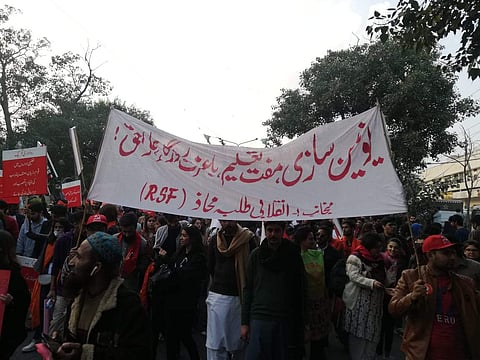

For more than a month, the students of Delhi's Jawaharlal Nehru University have been protesting against the administration, asking it to roll back the massive fee hike. A few hundred kilometres away from the university, on the other side of the Radcliffe Line, a group of students raised their voice about something similar, on November 29. Students from all over Pakistan, belonging to 25 different organisations conducted a Student Solidarity March in different cities.
Their demands weren't much different from the ones that most protesting Indian students have been raising for the past few years. That includes lifting the ban on student political activities on campus, the formation of anti-harassment committees on campus with the representation of women students, allocation of at least 5 per cent of the GDP towards education, ending violence on campus, providing housing facilities, free education, ending hostel curfew hours and employment for graduates. They say that many universities in Pakistan too face a fee hike and that there was a budget cut of 50 per cent in the Higher Education Commission
Now there are few other similarities between these students and the students of JNU. Both have been called anti-nationals and have been asked to leave the country. "We are told that 'if you are not satisfied with your country, leave'," says Ammar Yasir, a member of Revolutionary Students' Front, one of the participating organisations. While the latter are asked to go to Pakistan, this group is often asked to go to India.
JNU's #FeesMustFall is surely inspirational for their counterparts across the border. Ammar says, "#FeesMustFall is very inspirational for the students of Pakistan. Our slogans and the way of protesting are similar too. We too protest by beating drums." He goes on to say, "Slogans like Azadi and Asia Surkh Hai defied the imperialist borders. Same slogans are being chanted in Dehli and Lahore. Verses by the Pakistani poets Habib Jalib and Faiz Ahmad Faiz are being recited by the students of JNU and Ram Prasad Bismil’s “Sarfroshi ki Tamana” became the symbol of Pakistani students’ resistance."
